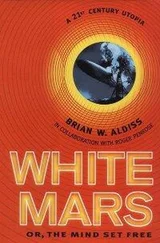Since then, Martian Time-Slip had been floating round in a limbo of its own, in a tombworld of non-publication, with nothing ever happening to it again.
1. Martian Time-Slip, by Philip K. Dick, NEL, 1976. This edition marks its first English publication, belated but perhaps – in view of Dick’s growing reputation as a master of science fiction – not untimely.
Why They Left Zirn Unguarded: The Stories of Robert Sheckley Why They Left Zirn Unguarded: The Stories of Robert Sheckley Nesvadba: In the Footsteps of the Admirable Čapek Verne: The Extraordinary Voyage Vonnegut: Guru Number Four Barefoot: Its First Decade The Gulf and the Forest: Contemporary SF in Britain Looking Forward to 2001 The Hiroshima Man From History to Timelessness The Hashish Club 1951: Yesterday’s Festival of the Future The Sower of the Systems: Some Paintings by G. F. Watts The Fireby-Wireby Book SF Art: Strangeness with Beauty The Film Tarkovsky Made Kissingers Have Long Ears Spielberg: When the Mundane Breaks Down Sleazo Inputs I Have Known It Catechised from Outer Space: Politics in SF The Flight into Tomorrow Burroughs: Less Lucid than Lucian ‘Yes, well, but …’ The Universe as Coal-Scuttle California, Where They Drink Buck Rogers Modest Atmosphere with Monsters Cultural Totems in the Soviet Union A Swim in Sumatra About the Author Also part of The Brian Aldiss Collection Copyright Конец ознакомительного фрагмента. Текст предоставлен ООО «ЛитРес». Прочитайте эту книгу целиком, купив полную легальную версию на ЛитРес. Безопасно оплатить книгу можно банковской картой Visa, MasterCard, Maestro, со счета мобильного телефона, с платежного терминала, в салоне МТС или Связной, через PayPal, WebMoney, Яндекс.Деньги, QIWI Кошелек, бонусными картами или другим удобным Вам способом. About the Publisher
The early and mid-fifties formed a period of great richness for SF (although we did not notice at the time). Magazines sprouted and proliferated as never before, in a last glory before the onslaught of paperbacks – in much the same way, I imagine, that all the crack stage-coach runs in this country were at their peak in the very years the railways were making them obsolete.
Smith’s bookstalls were flooded with covers celebrating marvels of astronomy and space-engineering, much as they now sport anatomy and the freaky electronics of pop. Then it was that one bought one’s first Galaxys , F&SFs , Thrilling Wonders , IFs , Spaces , Fantastics , and the lesser but delectable breeds, all of which seemed to be edited by Robert Lowndes: Future , Original , and Dynamic . These magazines were not imports but British reprints.
Among the clever new names, one searched particularly for those of Richard Matheson, William Tenn, Ray Bradbury, Philip K. Dick, Walter Miller, and – if one was smart enough – J. G. Ballard. They were all short-story writers; the SF magazines were the ideal medium; and none of them was as much fun as Robert Sheckley.
The typical Sheckley appearance was in Galaxy , edited by the celebrated madman H. L. Gold, where he appeared beside other celebrated madmen like Alfred Bester and Theodore Sturgeon. Madmen are essential to SF. We still have madmen today, but often the madness gets into the style rather than the story, as with Harlan Ellison and some of the layabouts in New Worlds Quarterly . Sheckley kept his madness honed to a fine point by writing clear English about utterly convincing impossibilities. After all the sobersides in Astounding , it was marvellous to read a man whose characters never scored victories (though they rarely suffered utter defeat), whose planets were lunatic and draughty, whose aliens pursued totally inane rituals (like the Dance of the Reciprocal Trade Agreement), whose technologies were generally dedicated to perfecting robots which lurched and squeaked, and whose spaceships were never airtight.
That whole epoch, and the entire Sheckley thing , comes back very clearly as one reads this omnibus [1]– which is possibly an adverse criticism, for we have a somewhat one-dimensional view of Sheckley here. All the stories hail from the fifties, when Sheckley was young and clever. Now he’s old and clever, experience has had him by the lapels like one of his malfunctioning robots, and it would have been valuable to have been offered a few later fruits from his tree.
Those later fruits have a taste of acid to them, a fragrance of corruption, and a feel of loss, which makes the best of them more memorable than the earlier ingenuities which Conquest rightly celebrates.
For instance, in a 1972 short story, ‘The Mnemone’:
‘But these are futile gestures. The truth is, we have lost Xanadu irretrievably, lost Cicero, lost Zoroaster. And what else have we lost, what great battles were fought, cities built, jungles conquered? What songs were sung, what dreams were dreamed? We see it now, too late, that our intelligence is a plant which must be rooted in the rich fields of the past.’
There’s a note he never sounded in the fifties. Sheckley had roots only in the future. Nor could he write such a funny-poignant tale as his ‘Zirn Left Unguarded, the Jenghik Palace in Flames, Jon Westerly Dead’, (published in Nova 2, edited by Harry Harrison, 1972), in which Sheckley tenderly mocks the romantic-savage-analytical mode of science-fantasy of which he always had such easy mastery. And in Nova 3, there’s his ‘Welcome to the Standard Nightmare’, which is all that Sheckley ever was: the old ingenuity is still there, and a whole planet surrenders to one Earthman; but the mood is darker, the etching done with acid that bites deeper into the copper than once it did.
The story ends with the words: ‘For the Lorians were an advanced and intelligent people. And what is the purpose of being really intelligent if not to have the substance of what you want without mistaking it for the shadow?’ In the fifties, Sheckley’s characters were travelling too fast to worry about what was substance, what shadow.
My disagreement, then, is with editor Robert Conquest, not with Sheckley. He could have given us a more dimensional study of Sheckley. That has not been his intention. He admires Sheckley’s skill in telling an ingenious story, and he includes those stories which seem to him to exemplify this rare ability.
The result is a portly volume containing one Sheckley novel, Immortality Inc ., and a dozen short stories, among them several well-known and beloved by the SF fraternity, such as ‘Pilgrimage to Earth’, ‘A Ticket to Tranai’, ‘The Prize of Peril’, and ‘The Store of the Worlds’. Not a bad story among them.
Many of these stories use as their material the basic Shecklian preoccupations: the awfulness of institutions and corporations, the craziness of trying to establish a relationship with anyone, the arbitrariness of society’s mores, the difficulties one can get into with women, the sheer down-at-heel ghastliness of the galaxy. These, you might say, are almost anyone’s preoccupations; no disagreements or surprises there. The nice, the odd, thing about Sheckley’s preoccupations is that they are all counterbalanced by their very opposites. The television company that exploits you to the point of death is scrupulous to a pernickety degree; the girl genuinely loved you, but it was just a financial deal; it’s as efficient to hold citizens up in the street and rob them as to collect income tax, terrestrial fashion; your wife is perfectly nice, but when you find her in her lover’s arms, it’s because you refused to keep her in stasis; uncomfortable though we may find most worlds, there are races who are worse off, and leap from sun to sun complaining of the cold. In effect, Sheckley’s madness is presented with a disarming reasonableness. At least his future’s no worse than the present; and if you think the galaxy’s hell, try staying at home. He’s telling you a story, not presenting a case.
Читать дальше










